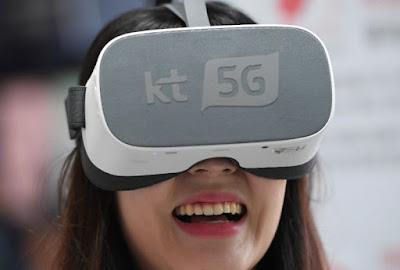Yahoo – AFP, Kang Jin-kyu, April 3, 2019
 |
A number of South Korea's tech giants are to launch new, 5G-enabled devices
to coincide with the country switching over to the high-speed technology
(AFP Photo/JUNG Yeon-Je) |
Seoul (AFP)
- South Korea on Friday launches the world’s first nationwide 5G mobile
networks -- a transformational leap that has superpowers sparring for control
of an innovation that could potentially change the day-to-day lives of billions
of people.
The
superfast communications heralded by fifth-generation wireless technology will
ultimately underpin everything from toasters to telephones, from electric cars
to power grids.
But while
the South has won the race to be first to provide the user experience, that is
only one part of a wider battle that has pitted the United States against China
and ensnared giants including Huawei.
Hyper-wired
South Korea has long had a reputation for technical prowess, and Seoul has made
the 5G rollout a priority as it seeks to stimulate stuttering economic growth.
The system
will bring smartphones near-instantaneous connectivity -- 20 times faster than
existing 4G -- allowing users to download entire movies in less than a second.
 |
The new 5G
technology will eventually be used to run everyday appliances including
games
machines, toasters, telephones and electric cars (AFP Photo/JUNG Yeon-Je)
|
In the same
way that 3G enabled widespread mobile web access and 4G made new applications
work ranging from social media to Uber, 5G will herald a new level of
connectivity, empowered by speed.
It is
crucial for the future development of devices ranging from self-driving
vehicles that send data traffic to one another in real time to industrial
robots, drones and other elements of the Internet of Things.
That makes
it a vital part of the infrastructure of tomorrow, and the 5G standard is
expected to bring about $565 billion in global economic benefits by 2034,
according to the London-based Global System for Mobile Communications, an
industry alliance.
'One
million devices'
But the
implications of the new technology have pitted Washington against Beijing in an
increasingly bitter standoff.
The US has
pressed its allies and major economies to avoid 5G solutions from Chinese-owned
telecom giant Huawei, citing security risks that technological backdoors could
give Beijing access to 5G-connected utilities and other components.
 |
Long-anticipated
deployment of ultrafast 5G wireless networks is beginning in
South Korea and
the United States (AFP Photo/GABRIEL BOUYS)
|
But Chinese
firms dominate 5G technology.
Huawei, the
global leader, has registered 1,529 5G patents, according to data analysis firm
IPlytics.
Combined
with manufacturers ZTE and Oppo, plus the China Academy of Telecommunications
Technology, Chinese entities own a total of 3,400 patents -- more than a third
of the total, according to the research firm.
South Korea
comes next, with its companies holding 2,051 patents.
In
contrast, US firms have 1,368 altogether, IPlytics said -- 29 fewer than
Finland's Nokia alone.
All three
of South Korea's mobile operators -- KT, SK Telecom and LG UPlus -- will go
live with their 5G services on Friday.
"5G's
hyper speed can connect one million devices within a one square kilometre zone
simultaneously," KT said in a report.
 |
LG senior
vice president David VanderWaal discusses 5G at the 2019
Consumer Electronics
Show in Las Vegas in January (AFP Photo/Robyn Beck)
|
Neither KT
nor SK Telecom use Huawei technology in their 5G networks, but it is a supplier
to LG UPlus, the companies told AFP.
On the same
day, Samsung Electronics will release the Galaxy S10 5G, the world's first
available smartphone using the technology, and rival phonemaker LG follows with
the V50s two weeks later.
Deployment in US market
Until now,
no mobile networks have offered nationwide 5G access.
US network
carrier Verizon said Wednesday it became the first carrier in the world to
deploy a 5G network -- in Chicago and Minneapolis, with more cities due to
follow this year.
The system
will work with Lenovo's Moto Z3 smartphone.
“Verizon customers will be the first in the world to have the power of 5G in their hands," said Hans Vestberg, Verizon's chairman and chief executive officer. "This is the latest in our string of 5G firsts."
 |
The
development of wireless mobile networks from the 1980s to the introduction
of
5G communications (AFP Photo/Jonathan WALTER)
|
Rival US
carrier AT&T deployed what it called its 5G E network in 12 cities last
year with speeds faster than 4G networks but below those being deployed in
other fifth-generation systems.
Andre
Fuetsch, president of AT&T Labs, said in a statement Wednesday that
independent testing shows "that we are the fastest wireless network
nationwide."
Qatari firm
Ooredoo says it offers 5G services in and around Doha -- but does not have
devices available to use them.
Japan is
also expected to roll out a limited deployment in 2019 before full services
start in time for next year's Tokyo Olympics.
Cost
barrier
More than
three million South Koreans will switch to 5G by the end of this year,
predicted KT vice-president Lee Pil-jae.
Cost is
likely to be a barrier initially for user uptake, analysts say, as the cheapest
version of the new Galaxy handset will be priced at 1.39 million won ($1,200).
"While
there are many cheap 4G smartphones under $300, Samsung's 5G phones are well
over $1,000, which could be a major minus point for cost-savvy consumers,"
a KT representative told AFP.
None of
South Korea's three network operators would say how much they have invested in
5G, but Seoul's economy minister Hong Nam-ki estimate it would be at least $2.6
billion this year alone.
"If 5G
is fully implemented," he said, "it will greatly improve people's
lives".








No comments:
Post a Comment